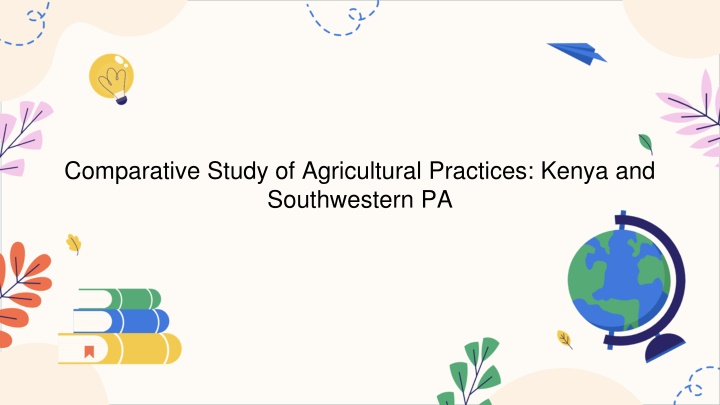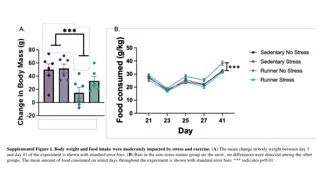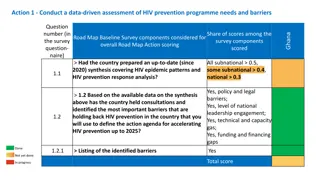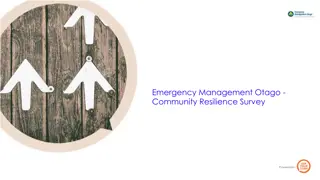Otago Evidence-Based Exercise Programme for Fall Prevention
The Otago Evidence-Based Exercise Programme (OEP) is a proven intervention aimed at preventing falls in elderly individuals. It consists of home-based exercises focused on strengthening muscles and improving balance, tailored for those aged 65 and above, with the most effectiveness seen in individuals aged 80 and older with a history of falls. The programme includes a set of exercises, walking plans, and community classes, all designed to reduce the risk of falls and enhance overall well-being. Participants are guided to practice exercises at home and attend weekly classes, supported by volunteers. With clear guidelines for inclusion and exclusion, the OEP is a cost-effective and beneficial approach to enhancing strength and mobility in older adults.
Download Presentation

Please find below an Image/Link to download the presentation.
The content on the website is provided AS IS for your information and personal use only. It may not be sold, licensed, or shared on other websites without obtaining consent from the author.If you encounter any issues during the download, it is possible that the publisher has removed the file from their server.
You are allowed to download the files provided on this website for personal or commercial use, subject to the condition that they are used lawfully. All files are the property of their respective owners.
The content on the website is provided AS IS for your information and personal use only. It may not be sold, licensed, or shared on other websites without obtaining consent from the author.
E N D
Presentation Transcript
Comparative Study of Agricultural Practices: Kenya and Southwestern PA
Welcome to Agricultural Insights Today we will explore agricultural practices and their environmental impacts. We'll compare sustainable methods and degradation issues in Kenya and Southwestern PA. Think about how agriculture shapes the environment and communities where you live.
Agriculture in Kenya: An Overview Agriculture is a key sector in Kenya, contributing to the economy and food security. Diverse climates allow for a variety of crops and livestock. Challenges include climate change, land degradation, and water scarcity. How might these challenges affect food production and local communities?
Sustainable Agriculture in Kenya Conservation agriculture: minimal soil disturbance, crop rotation, and cover crops. Agroforestry: integrating trees into farming systems for better soil and water conservation. Organic farming: reducing man-made chemical inputs to preserve soil health and biodiversity. Can you think of other benefits of sustainable agriculture?
Environmental Damage in Kenya Deforestation for agriculture leads to habitat loss and reduced rainfall. Overgrazing by livestock causes soil erosion and destruction. Chemical runoff from farms pollutes water sources and harms wildlife. In what ways can these issues be lessened? Deforestation in Kenya. Deforestation in Kenya: Causes and Factors, Effects of Deforestation, Statistics, www.ecohubmap.com/hot-spot/deforestation-in-kenya/3zerb1klk4ct6i3. Accessed 5 June 2024.
Agriculture in Southwestern PA: An Overview Agriculture in Southwestern PA includes dairy, corn, and soybean production. The region's temperate climate and rolling hills shape its farming practices. Urbanization and economic shifts impact the agricultural landscape. How do these factors influence farming choices in Southwestern PA?
Sustainable Agriculture in Southwestern PA Community Supported Agriculture (CSA) programs promote local, seasonal food. Integrated Pest Management (IPM) reduces the need for chemical pesticides. No-till farming preserves soil structure and reduces erosion. What are some local foods you've encountered that are grown sustainably?
Environmental Damage in Southwestern PA Historical coal mining has left a legacy of soil and water contamination. Conventional farming can lead to nutrient runoff and waterway eutrophication. Loss of farmland to development disrupts ecosystems and reduces green space. How can communities work together to address these environmental challenges? LIttle Blue Run Lake in Beaver County, PA is a man made lake that covers approximately 1,900 acres and forms the largest coal ash impound in the United states. (Image Science and Analysis Laboratory, Gateway to Astronaut Photography of Earth. NASA, NASA, eol.jsc.nasa.gov/. Accessed 5 June 2024.
Comparing Sustainable Practices Both Kenya and Southwestern PA use crop rotation and organic farming to enhance sustainability. Agroforestry in Kenya and CSA in Southwestern PA both promote biodiversity. How do these practices reflect the unique environments of each region?
Comparing Environmental Challenges Kenya faces deforestation, while Southwestern PA deals with post-industrial pollution. Overgrazing in Kenya and nutrient runoff in Southwestern PA both affect soil and water quality. How can lessons from one region inform practices in the other?
Global Impact of Local Agriculture Agriculture's environmental impact extends beyond local borders. Climate change is a global issue influenced by agricultural practices. Sustainable methods can contribute to global environmental health. In what ways can we support sustainable agriculture locally and globally?
Technology in Sustainable Agriculture Precision farming uses technology to optimize field-level management. Drones and satellite imagery help monitor crop health and resource use. How might technology further improve sustainability in agriculture? https://www.nifa.usda.gov/about-nifa/impacts/using-drones- agriculture-natural-resources
Policy and Agriculture Government policies can incentivize sustainable practices or contribute to degradation. In Kenya, policies aim to increase forest cover and manage water resources. In Southwestern PA, conservation programs support soil and water quality. What role should governments play in shaping agricultural practices?
Community Involvement in Agriculture Community gardens and urban farms bring sustainable practices to cities. Educational programs raise awareness about the impacts of agriculture. Farmer's markets in Southwestern PA and local cooperatives in Kenya support small-scale farmers. How can you participate in your local agricultural community?
Future of Farming: Adapting to Change Crop diversification and water conservation are key to resilience. Sustainable agriculture can help ensure food security for future generations. What changes do you think are necessary for a sustainable agricultural future?
Conclusion: Our Role in Sustainable Agriculture Our choices as consumers can support sustainable practices. Educating ourselves and others about the impacts of agriculture is crucial. Advocating for policies that protect the environment ensures a healthier planet. What actions will you take to promote sustainable agriculture in your community?























